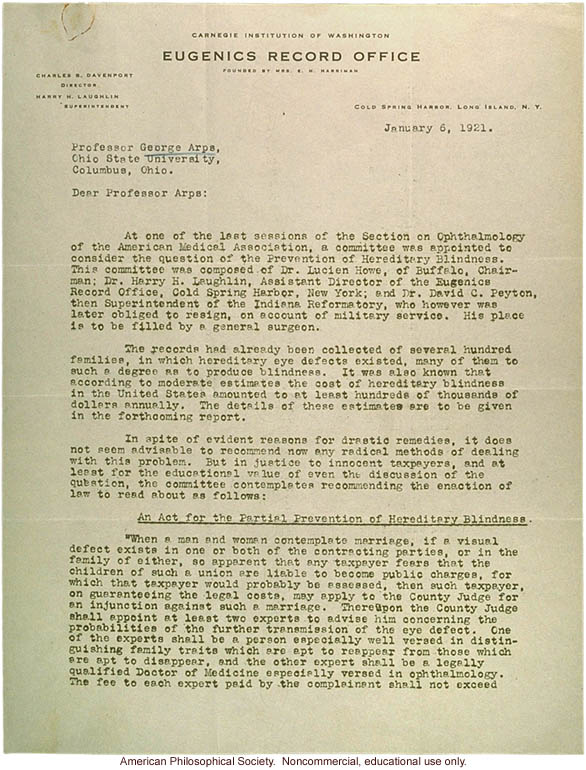Opthamologists responses to survey seeking support for hereditary blindness law (1)

Response to a Eugenics Record Office survey of ophthamologists seeking support for a eugenic law to restrict marriage for people with hereditary blindnes. Dr. Ellice M. Alger, of New York City, notes that such a law would favor those wealthy enough to post the bond and that "the abuses and injustices would outweigh the social benefit."
300. Carnegie Institution of Washington Eugenics Record Office Founded by [illegible] Charles B. Davenport, Director Harry H. Laughlin, Superintendent Cold Spring Harbor, Long Island, N.Y. January 6, 1921. Professor George Arps, Ohio State University, Columbus, Ohio. Dear Professor Arps: At one of the last sessions of the Section on Ophthalmology of the American Medical Association, a committee was appointed to consider the question of the Prevention of Hereditary Blindness. This committee was composed of Dr. Lucien Howe, of Buffalo, Chairman; Dr. Harry H. Laughlin, Assistant Director of the Eugenics Record Office, Cold Spring Harbor, New York; and Dr. David C. Peyton, later obliged to resign, on account of military service. His place is to be filled by a general surgeon. The records had already been collected of several hundred families, in which hereditary eye defects existed, many of them to such a degree as to produce blindness. It was also known that according to moderate estimates the cost of hereditary blindness in the United States amounted to at least hundreds of thousands of dollars[sic] annually. The details of these estimates are to be given in the forthcoming report. In spite of evident reasons for drastic remedies, it does not seem advisable to recommend now any radical methods of dealing with this problem. But in justice to innocent taxpayers, and at least for the educational value of even the discussion of the question, the committee contemplates recommending the enaction of law to read about as follows: An Act for the Partial Prevention of Hereditary Blindness "When a man and woman contemplate marriage, if a visual defect exists in one or both of the contracting parties, or in the family of either, so apparent that any taxpayer fears that the children of such a union are liable to become public charges, for which that taxpayer would probably be assessed, then such taxpayer, on guaranteeing the legal costs, may apply to the County Judge for an injunction against such a marriage. Thereupon the County Judge shall appoint at least two experts to advise him concerning the probabilities of the further transmission of the eye defect. One of the experts shall be a person especially well versed in distinguishing family traits which are apt to reappear from those which are apt to disappear, and the other expert shall be a legally qualified Doctor of Medicine especially versed in ophthalmology. The fee to each expert paid by the complainant shall not exceed
- ID: 10295
- Source: DNALC.EA


